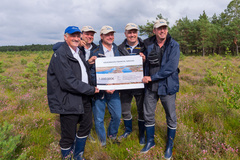NABU and Volkswagen Financial Services’ International Peatland Protection Fund off to a good start
The international peatland conservation initiative from the Wildlife Protection Society of Germany (NABU) and Volkswagen Financial Services starts with the restoration of peatland areas damaged by drainage and peat cutting in the Slowinski National Park and in Western Pomerania in Poland. On site in the Krakulice peatlands NABU president Olaf Tschimpke presented a scientific study to Lars-Henner Santelmann, Director of Sales and Marketing at Volkswagen Financial Services AG, and Wolfram Thomas, Group Chief Officer for the Environment, Energy and New Business Areas at Volkswagen AG. The study is the basis for peatland protection projects in northern Eurasia. In addition, Volkswagen Financial Services presented concrete measures to promote environmental fleet management in the Polish automotive market.
The basis of the peatland protection initiative in Poland was the establishment at the beginning of the year by NABU of the International Peatland Protection Fund (IPCS) with a five-year funding commitment from Volkswagen Financial Services to the tune of one million euros. "In Germany we have gained very good experience with this type of financing instrument, supporting 13 peatland conservation projects," says Santelmann, adding, "Our long-term commitment to the fund shows that we are serious about the concrete promotion of climate protection projects and that climate protection is an integral part of our corporate philosophy."
Peatlands have a key function in global climate regulation and biodiversity. Unfortunately, in many countries they have lost their capacity to act as carbon sinks and are at risk of drying out as a consequence of agricultural and forestry practices, for instance, in Poland. Destroyed peatlands emit large quantities of greenhouse gases, such as CO2, methane and nitrous oxide, into the atmosphere.
NABU’s peatland study, funded by Volkswagen AG and Volkswagen Financial Services, forms the conceptual framework for the International Peatland Protection Fund. The study demonstrates the potential for restoring and improving the conservation of peatlands in eastern Europe and the European part of Russia. In addition, the efficient use of funds for conserving peatland is detailed on the basis of concrete case studies. According to Thomas, "On the way to becoming the ecological number one the subject of biodiversity plays an important role for the Volkswagen Group. With our joint efforts to protect peatlands we are achieving extremely positive impacts in terms of protecting the climate, biodiversity, ecosystems and natural resources, such as water.”
The first restoration areas funded by the International Peatland Protection Fund lie in Western Pomerania on the Baltic coast of Poland. The aim is to restore at least 900 hectares of peatland in Poland to their original state. Decades of draining the peatlands is destroying their capacity to store CO2. Together with NABU’s Polish partner Klub Przyrodników planning is underway to return the peatlands to their former pristine condition. "The conservation of peatlands in Germany and internationally represents a huge opportunity for protecting nature and our climate. The planned restoration projects in Poland will help save important natural paradises and sequester gases that endanger the climate. With the help of the International Peatland Protection Fund we intend to implement many projects of this kind," emphasises Tschimpke.
As a further initiative Volkswagen Financial Services is expanding its environmental fleet management programme to include Poland. Used vehicles make up almost 90 percent of sales on the Polish automotive market. The average age of vehicles in Poland is 14.3 years (source: Instytut badań rynku motoryzacyjnego, SAMAR). By comparison, in the entire European Union the average vehicle age is 8.3 years (source: European Automotive Manufacturers Association, ACEA). "The high age of the vehicles means we are seeing associated high CO2 emissions. This represents considerable potential for making the vehicle market more environmentally friendly," says Santelmann, "and we will, above all, be expanding our leasing business and offering short contract periods to make new vehicles more affordable." Other facets of environmental fleet management include ECO driving courses for major customers, fuel cards and fleetCARS fleet software for transparent CO2 reporting.

